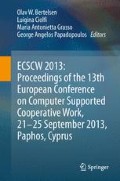Abstract
The organizational and social aspects of software engineering (SE) are now increasingly well investigated. This paper proposes that there are a number of approaches taken in research that can be distinguished not by their method or topic but by the different views they construct of the human agent acting in SE. These views have implications for the pragmatic outcome of the research, such as whether systems design suggestions are made, proposals for the development of practical reasoning tools or the effect of Social Network Systems on engineer’s sociability. This paper suggests that these studies tend to underemphasize the felt-life of engineers, a felt-life that is profoundly emotional though played in reference to ideas of moral propriety and ethics. This paper will present a study of this felt-life, suggesting it consists of a form of digital dwelling. The perspective this view affords are contrasted with process and ‘scientific’ approaches to the human agent in SE, and with the more humanistic studies of SE reasoning common in CSCW.
Access this chapter
Tax calculation will be finalised at checkout
Purchases are for personal use only
References
Bird, C., & Zimmerman, T. (2012) Assessing the value of branches with what-if analysis In: Proceedings of the 20th International Symposium on Foundations of Software Engineering (FSE 2012), USA: Research Triangle Park.
Bird, C., Nagappan, N., Devanbu, H., Gall & Murphy, B. (2009a). Does distributed development affect software quality? an empirical case study of windows vista In: Proceedings of the International Conference on Software Engineering.
Bird, C. N., Nagappan, P., Devanbu, H., Gall & Murphy, B. (2009b). Putting it all together: using socio-technical networks to predict failures. In: Proceedings of the 17th International Symposium on Software Reliability Engineering. USA: IEEE Computer Society.
Bird, C., Gall, H., Hagappan, N., Devanbu, P., & Murphy, B. (2011) Don’t touch my code!, ESEC/FSE’11 (pp. 5–9).
Button, G., & Sharrock, W. W. (1994). Occasioned practices in the work of software engineers. In J. Goguen & M. Jirotka (Eds.), Requirements engineering: social and technical issues. San Diego: Academic Press.
Coleman, S., & Hellerman, P. (2011). Multi-sited ethnography. London: Routledge.
de Souza David, C R B., & Redmiles, F. (2008). An empirical study of software developers’ management of dependencies and changes, In: Proceeding ICSE (pp. 241–250).
de Souza David, C R B, & Redmiles, F. (2011). The awareness network, to whom should i display my actions, and, whose actions should i monitor? IEEE Transactions on S.E, 37(3), 325–339.
Foucault, M. (1966). The order of things. Chicago: Chicago University Press.
Harper, R. (2011). Texture: human expression in the age of communications overload. Boson: MIT Press.
Hine, C. (2000). Virtual ethnography. London: Sage.
Ingold, T. (2011). Being alive: essays on movement. Routledge: Knowledge and Description.
Martin, D., Rooksby, J., Rouncefield, M., & Sommerville I. (2007). ‘Good’ organisational reasons for ‘bad’ software testing: An ethnographic study of testing in a small software company. In Proceedings of ICSE (pp. 602–611).
Mosse, D. (2006). Anti-social anthropology? objectivity, objection and the ethnography of public policy and professional communities. Journal of the Royal Anthropological Institute, 12(4), 935–956.
Nagappan, N., Murphy, B, & Basili, V. (2008). The influence of organizational structure on software quality: an empirical case study. In Proceedings of the 30th international conference on software engineering.
O’Connor, J. (2012) The trolley method of moral philosophy. Essays in Philosophy, 13(1), 14.
Phillips, S., Sillito, J., and Walker, R. (2011). Branching and merging: an investigation into current version control practices. In International workshop on cooperative and human aspects of software engineering (CHASE’11), ACM (9–15).
Rettberg, J. (2009). Blogging. Cambridge: Polity.
Rönkkö, K., Dittrich, Y., & Randall, D. (2005). When plans do not work out: how plans are used in software development projects. Journal of Computer Supported Cooperative Work, 14(5), 433–468.
Rorty, R (1979). Philosophy and the mirror of nature. Princeton: Princeton University Press.
Schmidt, K, & Bannon, L (1992). Taking CSCW seriously: supporting articulation work. Journal of Computer Supported Cooperative Work, 1(1–2), 7–40.
Sommerville, I (2007). Software engineering (8th ed.). England: Pearson Education.
Storey, M., Ryall, J., Bull, R., Myers, D., inger, J. (2008). TODO or to bug: exploring how task annotations play a role in the work practices of software developers, In 30th International conference on software engineering (ICSE).
Storey, M., Treude, C., van Deursen, A., & Cheng, L. (2010). The impact of social media on software engineering practices and tools. In Proceedings of the FSE/SDP workshop on the future of software engineering research (FOSER 2010) (pp. 33–38).
Sykes, K. (2005). Arguing with anthropology. London: Routledge.
Williams, L. (2012). What agile teams think of agile principles. Communications of ACM, 55(4), 71–76.
Author information
Authors and Affiliations
Corresponding authors
Editor information
Editors and Affiliations
Rights and permissions
Copyright information
© 2013 Springer-Verlag London
About this paper
Cite this paper
Harper, R., Bird, C., Zimmermann, T., Murphy, B. (2013). Dwelling in Software: Aspects of the Felt-Life of Engineers in Large Software Projects. In: Bertelsen, O., Ciolfi, L., Grasso, M., Papadopoulos, G. (eds) ECSCW 2013: Proceedings of the 13th European Conference on Computer Supported Cooperative Work, 21-25 September 2013, Paphos, Cyprus. Springer, London. https://doi.org/10.1007/978-1-4471-5346-7_9
Download citation
DOI: https://doi.org/10.1007/978-1-4471-5346-7_9
Published:
Publisher Name: Springer, London
Print ISBN: 978-1-4471-5345-0
Online ISBN: 978-1-4471-5346-7
eBook Packages: Computer ScienceComputer Science (R0)

